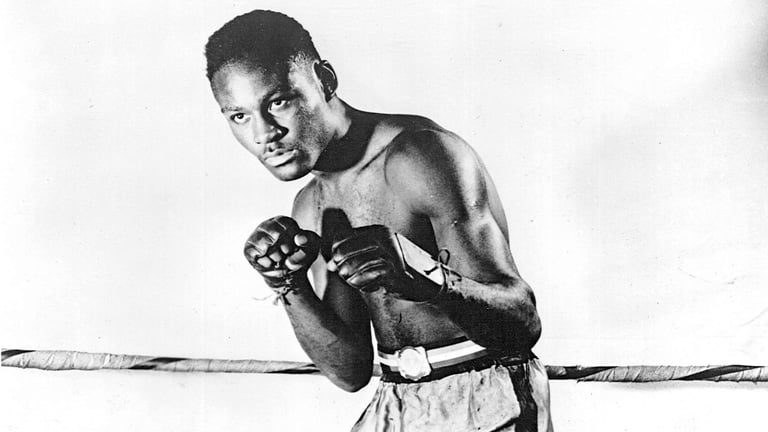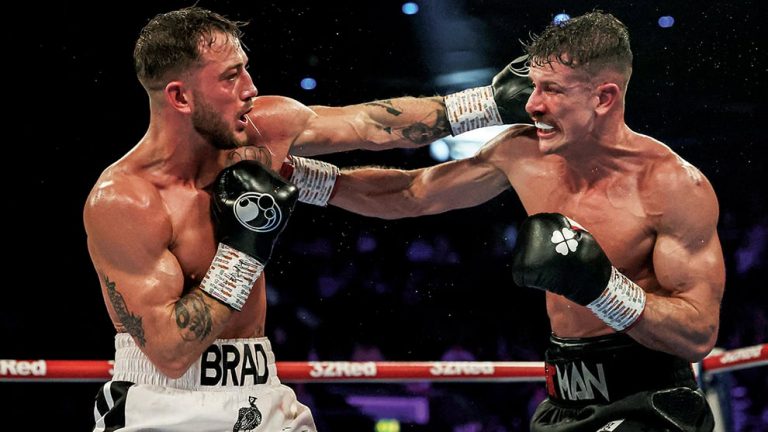Anatomy of an Upset: How Joseph Parker spoiled the party (twice)
By Elliot Worsell
THEY say the key to converting a penalty kick is to have a plan in mind – one pertaining to both how you will strike the ball and in what area of the goal this kick will be aimed – and to then stick to it. To second guess yourself or waver from this plan is not advised. Do that, they say, and you make room for indecision and therefore run the risk of being caught between ideas; unmoored in a dangerous sort of middle zone or purgatory.
In boxing, you would think a similar theory applies. After all, although nothing in a fight is quite so immediate or snap, in terms of decision-making, as a penalty kick, the success of a boxer in a fight is still very much predicated on their conviction and ability to carry out a plan. The clearer the plan, the easier it is to then follow and execute. The more belief they have that it will work, the less inclined a boxer may be to deviate from this plan or question either themselves or their coach.
And yet, the capacity to change, even during fight week, is an important one, as heavyweight Joseph Parker, 35-3 (23), can now attest. Last December, he had to do just that, you see. Scarier still, there were just five days until the fight; the most dangerous of his career.
“We were initially planning on doing a lot of movement and boxing,” explained Andy Lee, Parker’s coach. “Joe is technically a lot better than (Deontay) Wilder, I believe, but Wilder still has this unorthodox way of pouncing from far out and landing a punch with lightning speed.
“However, the more I watched Wilder, the more my opinion of him changed. Which is why, on the week of the fight, I said to Joe, ‘Joe, we’ve got to punch with him. We’ve got to change what we were going to do. When he throws his right hand, that’s when he will be most vulnerable.’
“So, from the Tuesday to the Saturday, that’s all we worked on: throwing the right hand when he threw his, as well as moving Joe’s head to his left and throwing his right over the top. That was enough to worry Wilder and keep him moving and tentative.”
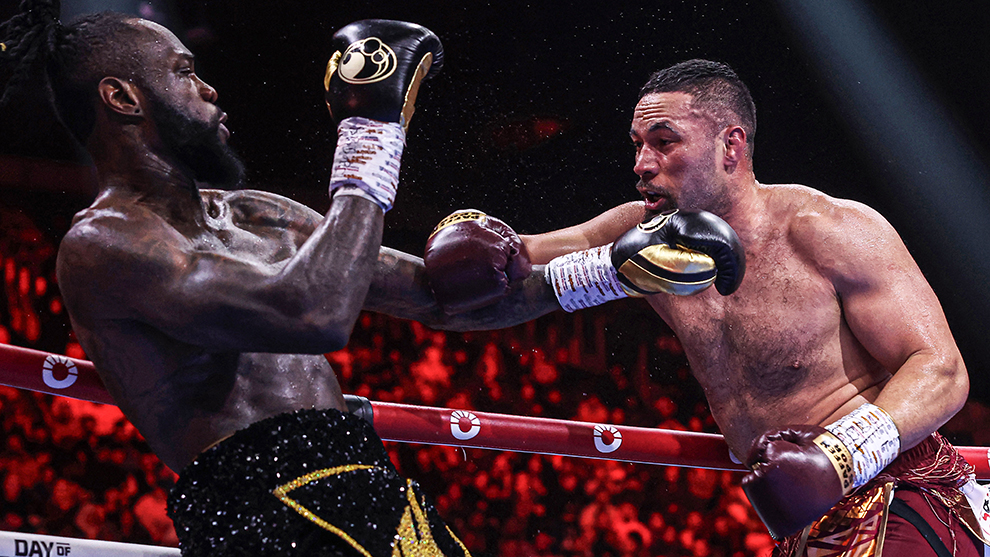
Joseph Parker outboxes Deontay Wilder during their heavyweight fight at Kingdom Arena on December 23, 2023 in Riyadh, Saudi Arabia (Richard Pelham/Getty Images)
Although it is made to sound easy, surviving Wilder, let alone beating him, is anything but. Indeed, while Lee has now guided a boxer to victory against Wilder on multiple occasions (a couple of times with Tyson Fury and once with Parker), he still has a habit of laughing uncomfortably whenever asked what the game plan would be for a fighter attempting to do something similar. For Lee knows more than anyone what it’s like to watch Wilder in the ring for 12 rounds and hope the lead Wilder’s opponent has built up is not eradicated in an instant by a swing of Wilder’s right hand.
“There’s no blueprint,” Lee said. “It’s not like I have a secret way of doing it. Tyson and Joseph are very different boxers. Tyson has the size and he is a dominating personality as well. He’s able to be aggressive and put Wilder on the back foot.
“With Joseph it was more about posing a threat all the time and keeping Wilder anxious enough not to throw that right hand. Even when you’re resting, look like you are ready to punch. Focus on your posture and how you shape up; look like you’re engaged but you’re actually resting. We worked on that a lot.”
Get everything right and it can still go badly wrong in the presence of a puncher like Wilder. This is something every Wilder opponent presumably understands when signing a contract to fight him and also when preparing both their body and a game plan in a 10-week camp. Never, whatever you do, get carried away with your success in the company of Wilder and never assume it is over until either the final bell rings or the referee is crossing his arms with Wilder in no fit state to continue.
“You can never feel safe with Wilder,” Lee confirmed. “You can never think you have a 10-round lead and be content to box and move. He will always, at any moment, have a chance to take you out.
“One big difference between the Wilder and (Zhilei) Zhang fights was how the fights progressed, in terms of time. I remember looking up at one point during the Wilder fight and it was only round three, yet it felt like we had been in the fight for ages. They were dragging and dragging, the rounds, whereas the Zhang fight just breezed by. Suddenly we were in round eight or nine and the end was in sight. The Wilder fight was one where you had to be focused for every second of every round… but then you could say the same for Zhang.”
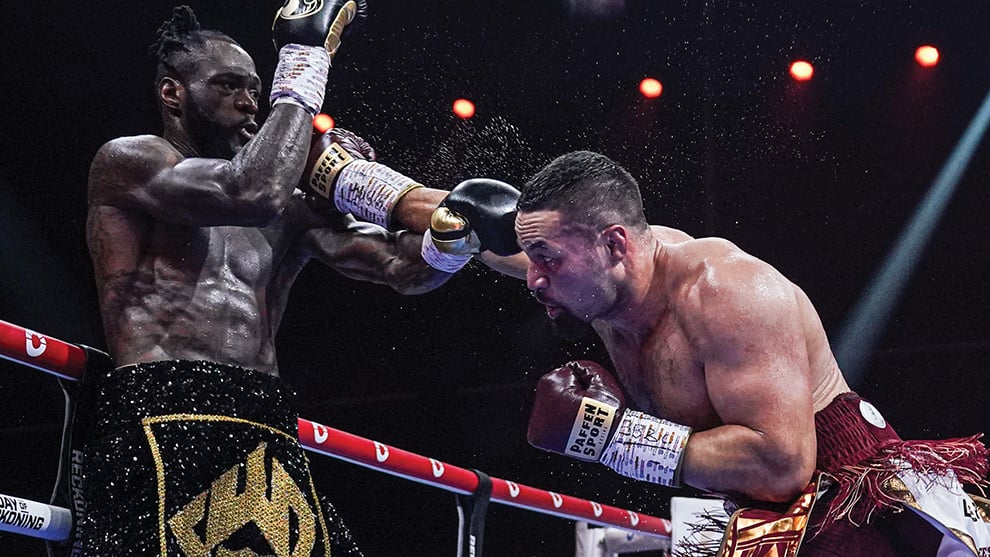
Joseph Parker attacks Deontay Wilder (Getty Images)
As for Zhilei Zhang, Parker’s opponent on March 8, there were clear and obvious differences between him and Wilder, yet the goal and, to some extent, the game plan for the New Zealander remained the same. In fact, the experience of sharing a ring with Wilder and defusing his threat by virtue of introducing uncertainty to a man normally full of conviction no doubt helped Parker against Zhang; a southpaw full of momentum and confidence who, like Wilder, was growing accustomed to winning fights with one punch.
“We collaborate on the game plan and you have to,” said Lee. “If he doesn’t believe in anything I tell him to do, it’s not going to work. So we talk and we figure it out in the gym and on the pads. Joe was reluctant to box and move in a typical back-foot style (against Zhang). I was thinking be (Evander) Holyfield against Riddick Bowe – be on your toes and box, box, box. Have a rhythm with your feet and punch, punch, punch, and then move.
“Even though Joe is more of a boxer, he still wants to be aggressive and stand. I went with him on that and, like a continuation of the Wilder fight, the key was to show a threat all the time. Be in a position to punch all the time. That way your opponent is never invited in to tee off. They have to be worried. There may not have been a lot of action, but if you look at the work Joe was doing when he wasn’t punching, that was what won him the fight. He was showing threat and he was throwing feints – a lot of feints. Feints are so important in these fights. That’s not a thing a lot of people do, but it’s so important.
“Zhang was more problematic than Wilder just because of the size of the man. He was physically very imposing; he was 47 pounds heavier than Joe. That’s an incredible size difference. Also, being a southpaw was big. Joe had only fought one southpaw in his career and that was in Samoa, I think. Apparently he didn’t look too good in it. Even in the past when we’ve been making matches, me and his manager, we have been very reluctant to fight southpaws. So that was a mental hump (fighting a southpaw) which turned into a mental victory for Joe. He had beaten one of the most dangerous southpaws in the division.”
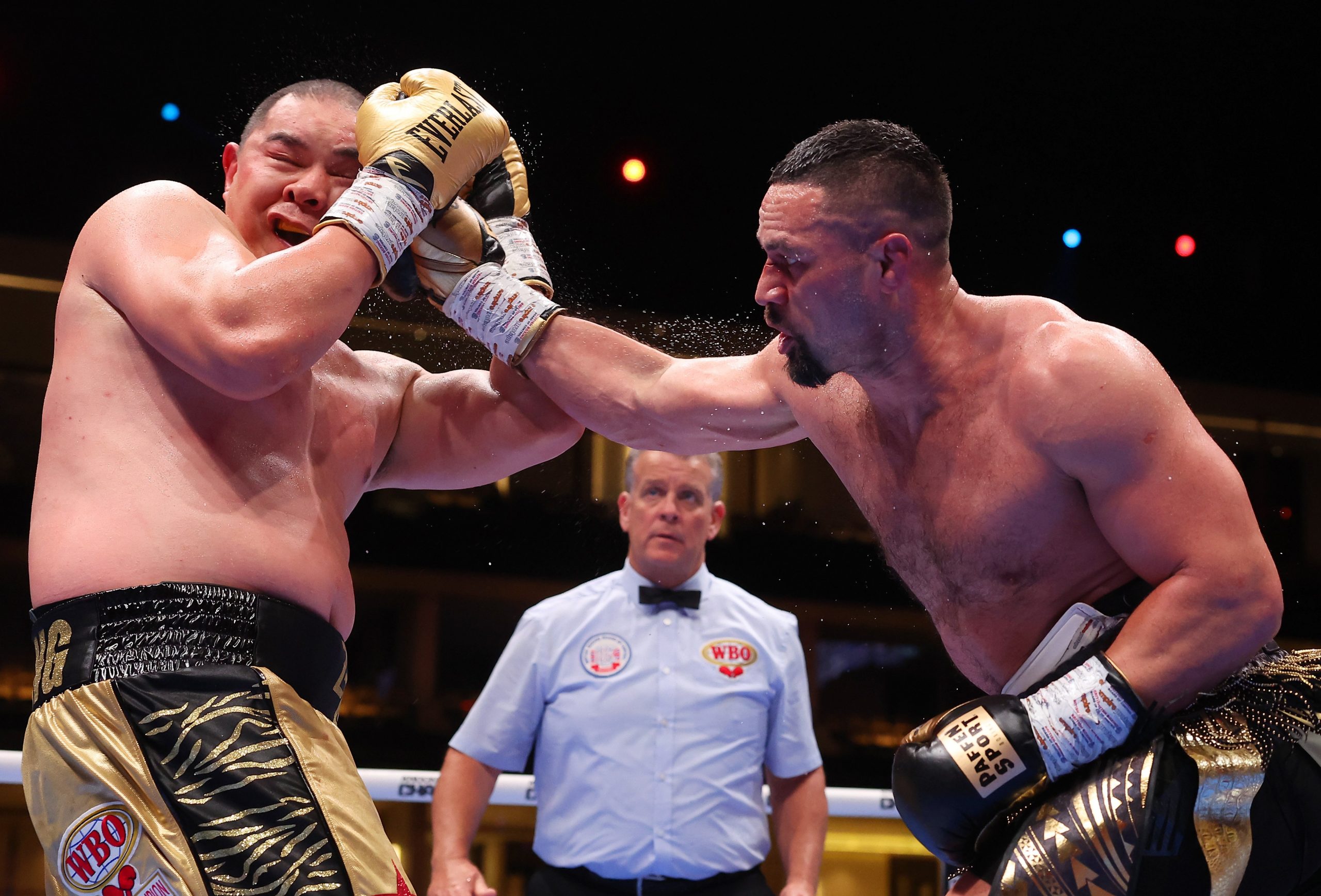
Joseph Parker aims a right hand at Zhilei Zhang during their heavyweight fight in Saudi Arabia (Richard Pelham/Getty Images)
What surely helped Parker in this mission was the fact that Lee, his coach and a former WBO middleweight champion, was a boxer who operated out of the southpaw stance in his own fighting days. More than just that, Lee was a left-hander who knew how to make the southpaw stance as awkward as possible, using his height, reach, and footwork to demoralise opponents long before his right hook typically finished the job in style. If nothing else, then, Parker, by linking up with Lee, now has an insight – some inside knowledge – on southpaws he was previously lacking.
“Everyone talks about getting your foot on the outside of a southpaw, but I don’t buy into that at all,” said Lee. “When I was a southpaw, I would be quite comfortable with my foot on the inside. ‘Always move to the southpaw’s right so you can get outside of his left hand…’ I don’t buy that either. Because if you move into the southpaw’s left hand you give yourself more distance and more time and room to see things. These are things people say a lot but I really don’t buy into it. I think you’re showing your limits by saying that. For example, I never really bothered getting on the outside of my opponent’s left foot. I never put too much emphasis on that. That stuff can work, of course it can, but it’s not the be-all and end-all. It certainly shouldn’t be your focus.
“The thing with Zhang, which kept the nerves high, was that he would always punch after you punch,” added Lee. “Joe had to punch and then be very careful after the punch. He had to either defend with movement, clinch, or just smother him a little bit. He fought a very smart fight in that sense. Zhang was always, always there.”
Not only was Zhang forever poised and ready to explode, he also did something Wilder was unable to do in the 12 rounds he shared with Parker; that is, he dropped him – twice.
“Winning the round and then getting dropped… when you’re in with a big puncher that can happen,” said Lee. “Look at Joe’s reaction and how he stood up. The second knockdown was a right hook around the back of the head, which can be very dangerous, but he got up and, again, he received instructions in that moment and followed them. I told him to be calm, to be smart, to be defensive, to tie him up. Then, when he came back to the corner, he was fine.”
Allowing Parker to survive this mini crisis – two of them, to be exact – was his conditioning, for which Lee gives full credit to George Lockhart, and also the quiet, subdued nature of their surroundings. After all, if ever you have to endure a crisis, far better to endure one when you have the time and space to think and rationalise what is going on.
“The fights in Saudi (Arabia) are so quiet in the arena,” said Lee. “Joe could hear every word I was saying, and both Zhang and Wilder could, too. So there’s a psychological thing at play there as well. I remember one time in round nine or 10 saying, ‘He’s tired, Joe. Go for him.’ Zhang then looked at me and said something. He answered me. But even that must have put the thought (of being tired) in his mind.
“In the second (Derek) Chisora fight (at Manchester Arena), Joe couldn’t hear a word I was saying, yet in Saudi I can pretty much talk him through every round.
“The trust Joe has in me and what I’m saying is like nothing else, too. I can basically call out any combination and he will do it in that instant. For me, it’s good. It’s nice to see he has that trust in me and will do whatever I say. I might tell him to throw an uppercut, for example, which is always a dangerous shot to throw, and he will do it anyway.”
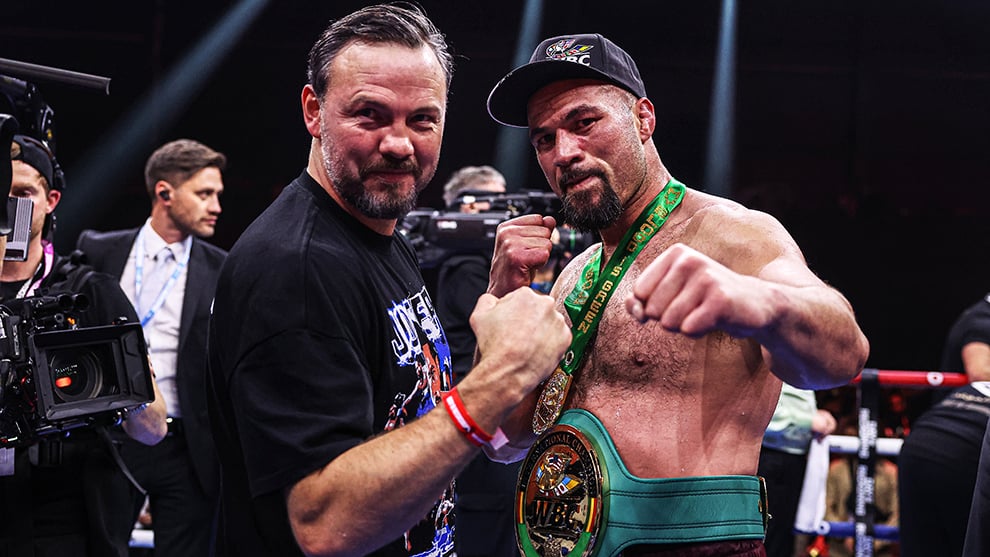
Lee and Parker celebrate the win against Deonaty Wilder (Richard Pelham/Getty Images)
To call anyone someone’s puppet master, or the hand inside the marionette, may carry certain sinister connotations, yet in this scenario, when discussing Lee and Parker, it seems applicable. If not the puppet master, instead think of Lee as the man operating the machine, or the kid holding the PlayStation controller. Whichever it is, belief is invariably the driving force. Parker’s belief in himself is one thing, but just as important is Parker’s belief in the person telling him what to do and when to do it.
“Belief is a big thing,” said Lee. “Whenever I would watch Joe from ringside – while doing commentary – I would see the things he could do. Then, in sparring and in the gym, I’m watching him and I’m thinking, Joe can beat all these guys. It’s just about instilling that belief.
“There have been a number of factors responsible for his turnaround since the (Joe) Joyce defeat, but fighting regularly has been key to it. Going from one fight to the next, and consistently training, has been good for him. He’s not having to start again after a long layoff and build himself back up and relearn the things he should be doing instinctively. They are becoming instincts now.
“He’s also working with George Lockhart, who does his strength and conditioning. He had been his nutritionist for a while, but I asked George to give the strength and conditioning a try and it’s just gone from strength to strength. We’re a three-man team. I can’t take all the credit. If Joe wasn’t fit or strong enough to maintain and do what he has to do, it wouldn’t work. He can only sustain what he is doing in the ring because he has the fitness and conditioning to do it.
“With Adam (Booth, Lee’s old trainer), I had never trained at that level before – in terms of what was physically required in the training. When you are doing those track sessions, those treadmill sprint sessions, circuits, and weights, they build you mentally as much as physically. They build a toughness and a resolve in you. You’re paying the price.”
The price, in every sense, has now been paid. For three decades Andy Lee has paid his dues, as both a fighter and a coach, and today Joseph Parker, having learned the pain of defeat and used it to grow, can be seen standing at the slot machine, hands out, ready to collect. He deserves every penny.

